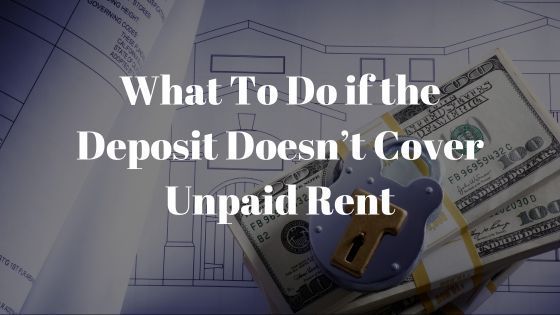What To Do if the Deposit Doesn’t Cover Unpaid Rent

Most landlords will require tenants to pay a security deposit as part of the initial moving costs. In North Carolina, how much you can charge tenants will depend on the length of the lease term. For instance, if it’s longer than month-to-month, the most you can charge them as a security deposit is 2 months’ rent.
This amount, however, may not be sufficient to cover the potential liabilities that may arise during a tenancy. Examples of such liabilities include unpaid rent and/or damage exceeding normal wear and tear. So, what should you do when the deposit doesn’t cover unpaid rent? In this article, we’ll walk you through everything you should know in this regard.
Make Appropriate Deductions on the Tenant’s Security Deposit
Most leases require tenants to return their rented premises in the same condition they found them in, less normal wear and tear. If the tenant doesn’t, you may be able to make appropriate deductions on their deposit.
Please note that you can only make deductions on damages exceeding normal wear and tear. Common examples include unapproved paint jobs, missing tiles or floor boards, or damaged windows. You may also be able to make further deductions if the tenant left the property in a dire state of uncleanliness. If the damages exceed the security deposit amount, the next step to make is to send them a demand letter.

Send the Tenant a Demand Letter for the Remaining Amount
This will, of course, be in addition to withholding the tenant’s security deposit. The demand letter should include some important information for it to be effective including:
- The date you wrote the letter.
- Your contact details, including your name, address, phone number, and email address.
- A description of the damages exceeding normal wear and tear.
- The name and address of the property.
- Any documentation of the damage, such as photos, if any.
- The total cost of the repairs needed, including labor and materials.
- A demand that the tenant pay the repair cost.
Make sure to use a professional, respectful tone when writing the demand letter. Also, ensure that you send the letter properly. Preferably, via certified mail with a return receipt for documentation purposes.
Consider Lodging a Lawsuit Against the Tenant
There is no guarantee that the tenant will honor the demand letter. In such a case, you can consider legal recourse. Ideally, you will want to file the lawsuit in a small claims court. This is especially true if the value of the lawsuit doesn’t exceed $10,000. From start to finish, you can, generally, expect the process to take two to three months. That being said, suing a tenant isn’t always a straightforward process.

Keep the following in mind:
- The process can be a time-sink. Going to court requires sufficient preparation. You will need to organize the evidence, research the court process, and make yourself available for the hearing. You will also need to pay a filing fee.
- The tenant may not be able to afford to pay you even after you’re successful in court. Obtaining a favorable judgment is one thing, and getting your money back from the defendant is another.
- Your evidence may be insufficient. It goes without saying that evidence is everything when it comes to court cases. If you don’t have proper evidence to support your case, you may have a difficult time in court.
- The North Carolina tenant may file a countersuit against you. This is always a possibility that you should consider when taking someone to court. This can lengthen the overall process.
Regularly Inspect Your Rental Property
Landlords know that inspecting their property is great for their bottom line. When you regularly inspect your rental property, you’re able to monitor its condition and make requested or needed repairs. This not only makes the tenant comfortable, but also ensures the property is up to code.
During the inspections, make sure to be on the lookout for:
- Issues with smoke and carbon monoxide detectors
- The functionality of all doors, windows, and locks
- Signs of damage, such as mold growth, pest infestations, and water stains
- The functionality of appliances
- The HVAC system is functionality
- The number of occupants living on the property
- Adherence to the pet policies

Make sure to schedule rental inspections per local regulations and the lease agreement. Also, make sure to provide the tenant with an advance notice before entering their rented premises.
Conduct a Walk-through Inspection of the Property
Before the tenant can move out, make sure to do a walk-through of the premises. Take note of any damages the tenant may have caused during their tenancy. If the tenant has caused damage exceeding normal wear and tear, provide them with an itemized list of issues and the cost of repair. Then, give them some time to make the repairs before the final walk-through inspection.
Hire a Property Manager to Manage Your Rental Property
Whether you’re just getting started, are living out-of-town, or already have a full-time job, hiring an expert can save you potential headaches and help you maximize return on investment. Some of the things a professional property manager can help you with include:
- Screening prospective tenants before they can move into your rental property.
- Inspecting your property from time to time.
- Conducting needed or requested repairs.
- Providing updated financial reports that can help you make informed decisions.
- Handling evictions of problem tenants.
Bottom Line
With our expert tips, now you know what to do should the deposit fail to cover unpaid rent. Just make sure to handle the situation as professionally and respectfully as possible. For expert help in managing your rental property, look no further than Dawson Property Management. We take pride in providing comprehensive leasing and rental home solutions to property owners in Charlotte and the surrounding areas. Get in touch today to get started!







